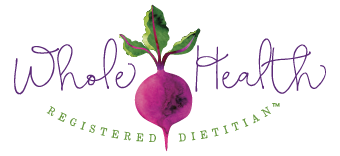Here we go again.
That’s the first thing that came to mind when I heard that a professor at Harvard called coconut oil “pure poison” last week.
I almost laughed, because many in academia call out those the alternative/holistic health sphere for using words like “poison” and “toxin.”
Last summer, the American Heart Association denounced coconut oil, causing the entire internet to freak out (#Coconutgate). There were some good arguments against their conclusion (1, 2).
This post isn’t actually about coconut oil. I’m a fan in case you were wondering, but I don’t recommend you guzzle it or put it in your coffee (it’s still an oil and should be consumed in moderation). I see the fact that it’s saturated as a positive thing. Saturated means very stable – not prone to oxidation like the industrial vegetable oils the food industry wants you to eat. Humans are saturated too – we’re mammals. However, we’re becoming increasingly UNsaturated due to the Western diet (3). But that’s beside the point.
This post is about confusion. Every week, I talk to potential clients who tell me they’re confused about what to eat. Fats and oils are just a small piece of this.
It seems like there is more confusion than EVER about health, nutrition, and what to eat. Sadly, I don’t think that confusion is going away anytime soon.
There is so much information out there. But with all this information about health and nutrition at our fingertips at all times, I don’t think we’re any smarter about nutrition.
And I don’t think we’re any healthier either.
Life expectancy and fertility are decreasing. Diabetes, obesity, and cancer rates are increasing.
Keto. Vegan. Paleo. Pescatarian. Moderation. Portion Control. WAPF. USDA. Clean Eating. The list is endless.
Everyone continues to pick sides, and stay in their bubble.
Everyone uses cherry-picked research studies to support their dogmatic beliefs, and then accuses everyone else of using cherry-picked research studies to support their dogmatic beliefs.
You can support any health belief with PubMed. Really.
I think the real problem that underlies all the confusion is that the word healthy is subjective. The word healthy is often used to describe a certain body type, which many will never attain (not for lack of trying!).
Or it’s used to describe a set of lab values deemed acceptable by insurance companies, who are influenced by pharmaceutical companies. These lab values keep changing over the years (4).
What if we used the word healthy to describe a well-functioning human and we ate in a way that supported that? That might look a little different for everyone, but there are probably principles applicable to all humans. But at any rate, that’s where I see the disconnect:
Eating to attain a certain body type or lab range – at the expense of feeling good.
How about focusing on the health parameters that truly show your body is functioning properly?
- Are you warm? Humans are mammals – we’re warm-blooded. A healthy human should be able to regulate their body temperature, meaning you should average 98.6 degrees. Body temperature should rise after eating, not drop. Hands and feet should be warm, not ice cubes.
- What is the state of your hair, skin, and nails? They’re indicative of how you’re fueling your body and if your gut can actually USE the vitamins and minerals that you’re eating.
- Are you a sloth all day or are you the Energizer bunny who then crashes? Neither are a sign of health. You should expect consistent, good energy levels throughout the day.
- Do you have at least one solid bowel movement a day and little to no gas, bloating, or heartburn?
- Can you sleep 8 consecutive hours with no urination or wake-ups (minus children, of course)?
- Do you have a normal menstrual cycle (28ish days) with little to no PMS, bloating, or cramps; and a healthy libido?
- How’s your mood?
- Are you sick all the time? Or do you have better than average resistance to colds, flu, and other infections?
There are dozens more, but these are the basic competencies of good physical function that most deserve your attention. These health parameters will tell you more about your health than your weight or any lab test. They all indicate a high metabolism – a high level of cellular energy production.
Master these and you mostly likely won’t need to worry about heart disease (5) or diabetes (6), and there’s evidence that you may not need to worry about cancer either (7, 8, 9, 10).
Master these and a healthy body composition with good strength and muscle tone will likely follow in time.
If Keto/veganism/Paleo/(insert diet of choice) is helping you meet the above parameters – that’s FANTASTIC. If you are failing in one or many of these areas, the problems you are experiencing probably are, at least in part, due to your diet and lifestyle practices.
“Since living cells are the fundamental units of all life, the basic science underlying human health and disease is the science explaining how living cells function. This basic science is cell physiology.” –Dr. Gilbert Ling
- http://blogs.plos.org/absolutely-maybe/2017/06/28/saturated-biases-where-the-aha-advice-on-coconut-oil-went-wrong/
- http://www.latimes.com/opinion/op-ed/la-oe-teicholz-saturated-fat-wont-kill-you-20170723-story.html
- https://wholehealthrd.com/the-biggest-dietary-change-in-american-history/
- https://www.financialexpress.com/opinion/cut-off-values-for-blood-sugar-blood-pressure-why-do-they-keep-changing-here-is-truth/951888/
- https://www.amazon.com/Hypothyroidism-Unsuspected-Illness-Broda-Barnes/dp/069001029X
- https://dm2.newlifeoutlook.com/body-temperature-and-type-2-diabetes/
- https://www.ncbi.nlm.nih.gov/pmc/articles/PMC2782690/
- https://www.ncbi.nlm.nih.gov/pmc/articles/PMC3873478/
- https://www.ncbi.nlm.nih.gov/pmc/articles/PMC3904378/
- http://theconversation.com/chilly-temperatures-help-cancers-grow-20386



